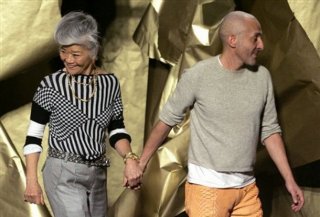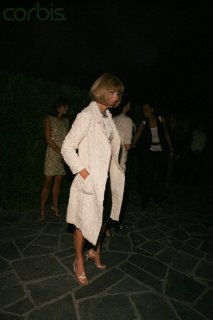You are using an out of date browser. It may not display this or other websites correctly.
You should upgrade or use an alternative browser.
You should upgrade or use an alternative browser.
How will you dress when you're older?
- Thread starter charlottesometimes
- Start date
fashionista-ta
Well-Known Member
- Joined
- Jul 14, 2005
- Messages
- 17,375
- Reaction score
- 917
^ I just saw a quote from Georgia saying that she had worn a black Japanese robe for the past 40 years, that when you get older you need a uniform. (Worth noting that she was a water sign if I recall correctly--Scorpio.) I doubt that I will ever be up for a uniform ... but I think it looks great on people who do it.
i take it you are a fan of georgia o keeffe...?!?...

Ha, yes, totally!
I feel like there have been a lot of other women who have pulled off the kind of "arty ranchero" look, but she is definitely the quintessential!
- Joined
- Jun 5, 2005
- Messages
- 2,646
- Reaction score
- 3
I want to be chic but not too ladylike. I once saw a woman, probably in her 80's, dressed really simply and timeless with a Chanel bag and she looked perfect. I want to look serene and healthy. With a closet comparable to a mini fashion museum.. 

thehappyhippyyy
Member
- Joined
- Jul 7, 2008
- Messages
- 965
- Reaction score
- 2
stellamare i agree!
I think a little bit of humor is a very attractive and important element of style for mature women.
I was going to say I'd wear Yohji in my sixties but he prob. won't be around anymore.. I think I would dress like Vivienne, at least sometimes.
I think I would dress like Vivienne, at least sometimes.
Like many have mentioned, I do grow more daring and myself with age.
I had a crazy French prof in her 80's who always sported black horn-rimmed glasses, pillbox hat, red lipstick and a bow blouse under a lovely suit. She was bent over but looked amazing with her little handbag and maryjanes and ready giggle.
I also disagree about miniskirts. I had another lovely elegant prof with gray hair and beautiful legs who often wore skirts above the knees, much like Carine.
Junko Shimada is still impishly coquettish in her sixties. Here she is on her runway, excuse the bad pics:
(storage.kanshin.com/cache.daylife.com)
I was going to say I'd wear Yohji in my sixties but he prob. won't be around anymore..
 I think I would dress like Vivienne, at least sometimes.
I think I would dress like Vivienne, at least sometimes.Like many have mentioned, I do grow more daring and myself with age.
I had a crazy French prof in her 80's who always sported black horn-rimmed glasses, pillbox hat, red lipstick and a bow blouse under a lovely suit. She was bent over but looked amazing with her little handbag and maryjanes and ready giggle.
I also disagree about miniskirts. I had another lovely elegant prof with gray hair and beautiful legs who often wore skirts above the knees, much like Carine.
Junko Shimada is still impishly coquettish in her sixties. Here she is on her runway, excuse the bad pics:
(storage.kanshin.com/cache.daylife.com)
Attachments
Last edited by a moderator:
fashionista-ta
Well-Known Member
- Joined
- Jul 14, 2005
- Messages
- 17,375
- Reaction score
- 917
^ There was an article about Yoko Ono recently in one of the major US fashion magazines, and she really looked fabulous ... there were pix of her wearing a wide range of outfits. And no pix of her performance art piece that she did again on a recent birthday where the audience cut away her Galliano dress  I doubt I'll be that ballsy myself, but I applaud her
I doubt I'll be that ballsy myself, but I applaud her 
 I doubt I'll be that ballsy myself, but I applaud her
I doubt I'll be that ballsy myself, but I applaud her 
D
dalgyal
Guest
very chic, and hopefully i'll be able to afford the higher-end brands by then! :]
^ There was an article about Yoko Ono recently in one of the major US fashion magazines, and she really looked fabulous ...
 She's the One.
She's the One. 

jadorechanel
Member
- Joined
- Nov 27, 2007
- Messages
- 47
- Reaction score
- 0
haute femme
turn and face the strange
- Joined
- Oct 11, 2005
- Messages
- 2,598
- Reaction score
- 2
Hopefully a mix between my granny (lots of linen, layered necklaces and jewelry, hats, patterns, long skirts, lots of chunky knit sweaters) and Diane Keaton.
lollicandy
Active Member
- Joined
- May 28, 2005
- Messages
- 1,370
- Reaction score
- 1
I kind of want to have crazy Daphne Guinness hair, or red hair, like a deep fiery red. I already have some white hair in my early 20s, not like huge chunks though, and I find it kind of fun to dye them. I can't wait until I'll have a head full of white to dye all the time.
silk skin paws
doldrums
- Joined
- Oct 10, 2005
- Messages
- 1,259
- Reaction score
- 2
Trousers, blouses, and dresses. More heels and jewelery I hardly wear heels and jewelry now. I don't think I will change much.
from: sophia
Not Thinking About Time
- Joined
- Oct 18, 2008
- Messages
- 1,729
- Reaction score
- 0
When I get out of school I will be older so I want to
- Have heels on everyday
-Have black leather bags
- No jeans
-Be able to afford designer and high quality clothing
I already try and dress nice. My parents always ask me why I am so dressed up I am wearing a dress and heels and they are wearing jeans and t shirts so I guess I dress older than my parents
actually I would love to dress like my grandmother who looks not a day over 50 and is actually 66. Channel glasses short wavy brown hair (dyed of course) a beautiful white gold watch never out in less than 3 inch heels silk tops and tailored pants. The only thing is that I dont want to shrink to be 4'10 ekk
- Have heels on everyday
-Have black leather bags
- No jeans
-Be able to afford designer and high quality clothing

I already try and dress nice. My parents always ask me why I am so dressed up I am wearing a dress and heels and they are wearing jeans and t shirts so I guess I dress older than my parents

actually I would love to dress like my grandmother who looks not a day over 50 and is actually 66. Channel glasses short wavy brown hair (dyed of course) a beautiful white gold watch never out in less than 3 inch heels silk tops and tailored pants. The only thing is that I dont want to shrink to be 4'10 ekk
Last edited by a moderator:
Belowen
♥ ♥ ♥ ♥ ♥ ♥ ♥
- Joined
- Apr 11, 2003
- Messages
- 25,729
- Reaction score
- 64
Hopefully age appropriate... My grandmother is a huge inspiration for me. She wears a lot of tailored pieces and has an amazing collection of accessories (that I am steadily inheriting) she also dresses well for seasons. Cropped pants & light jackets for the warmer weather, and turtlenecks, pencil skirts and tights for the cold weather... Amazing!
softgrey
flaunt the imperfection
- Joined
- Jan 28, 2004
- Messages
- 52,984
- Reaction score
- 413
great article from the Telegraph.co.uk
Is there anything for grown-up women to wear this season?
By LIZ JONES
Last updated at 10:49 18 June 2007
Vogue and Woman's Hour might be celebrating the older woman, but the fashion industry thinks the over-40s should be dressing like teens. What's a grown-up style guru to do? Before we all start debating the thorny issue of zero size models again (the government sponsored Model Health Inquiry?s interim report is due to be published in July), the hot topic in the world of fashion is age.
Earlier this month, Vogue published its first ever (as far as I could tell, but I looked back only as far as October 1975) 'age' issue, featuring on its cover a model in her 40s, Yasmin Le Bon, and another in her 50s, Marie Helvin.
Scroll down for more...
Life begins at 40 (left to right
Marie Helvin, Yasmin Le Bon, and Madonna
Then Emma Soames, the editor of Saga magazine, got involved in a hot debate on Radio 4's Woman's Hour with Gok Wan, the flamboyant stylist who presents Channel 4's How To Look Good Naked.
He was trying to persuade poor old Emma that, at the grand old age of 57, she could still carry off a mini skirt and racer back vest top.
But then it all got a bit schizophrenic at the end of last week when Madonna, who is 48, was criticised for indulging in too much Ashtanga yoga, which had made her face cave in (too much exercise releases too many harmful free radicals, don't you know).
Ooh and then, in a London evening paper, my former husband added two years to my age ? which is a bit of a cheek really, as he knows this is one area of my life I am particularly touchy about and there are certain statistics pertaining to him that, should I choose to reveal them, would certainly cramp his style in the dating department.
But I digress. It seems women can't win. The fashion industry tells us, over and over again, that we must have the skin, dress sense and body of a 16-year-old, but then if we strive to do what we have been told, we are criticised for trying.
Older women (and by older I mean 40-plus) are always being encouraged to buy their clothes in Topshop, but when we get there we find the only ones that will fit us would, if we only looked a little younger, make us look pregnant.
The cult for the very childlike that has permeated fashion, from the top to the bottom, for the past few decades is, I think, incredibly dangerous.
Rather than being able to relax a bit as we get older, ignore the more outrageous style stunts pulled by fashion and develop our own look, dressing elegantly and impeccably, our tastes and opinion of ourselves has been skewed, probably irreversibly.
But it's most interesting to point out that the fashion industry was not always so obsessed with trying hard to make us all look like very young, feeble girls.
On Thursday night, I went to a lecture given by a former Dior model to celebrate the 60th anniversary of the New Look ? the small-waisted, bighipped, big-skirted, soft-shouldered style silhouette that revolutionised fashion after the war.
As a mannequin for Monsieur Dior, this model wasn't much over 5ft 5in (today, all the girls are 6ft), and was 20 or 21 when she started out, while today any girl who wants to make it on the catwalk is barely out of nappies.
Christian Dior, surely the most talented designer of them all, not only didn't put a sufficiently high mark-up on his designs to be able to afford to give fancy dress parties aboard an outrageous yacht (in 1953, his margin was 10 per cent; if a garment cost $360, he once remarked, he made only $30), he didn't believe that women came in just one standard size.
He employed petite models, statuesque models and, hurrah, many of his most revered, favoured and elegant models were well over 50. He insisted that women should never dye their hair, and in his couture collections there was always a model with a silvery coiffure.
Perhaps Madonna, perhaps all of us not in the first flush of youth, should stop scrabbling to be something we are not. It is not a question of ?letting go? or not bothering.
It is a matter of being proud of our real age, of allowing ourselves, finally, to grow up.
We should not have to apologise for who we are, or for the fact we are not quite dead yet.
Similar Threads
- Replies
- 87
- Views
- 14K
- Replies
- 87
- Views
- 14K
- Replies
- 134
- Views
- 93K
- Replies
- 14
- Views
- 12K
Users who are viewing this thread
Total: 1 (members: 0, guests: 1)
New Posts
-
-
-
The Face Winter 2025 : Irina Shayk by Drew Vickers & Odessa A'Zion by Mario Sorrenti (10 Viewers)
- Latest: Kimy Jo
-
-






